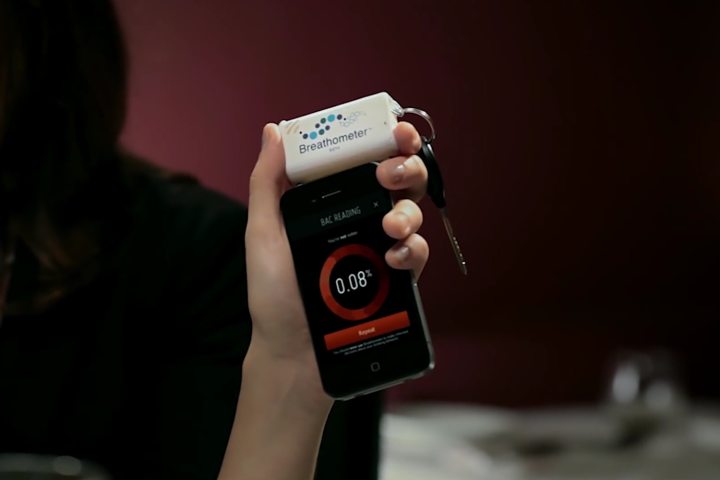
Breathometer might have been founded in 2012, but its story truly began in 2013 when the company launched its Indiegogo campaign for its self-titled breathalyzer accessory. Advertised as the world’s first smartphone breathalyzer, the Breathometer, in concert with its companion app, promised to provide an accurate blood alcohol concentration (BAC) measurement and track your past results for you to better judge how much time needs to pass before you can drive.
Enough people believed in the idea that, by the time the Breathometer’s crowdfunding efforts ran out of time, the device had garnered $138,437 from 3,816 backers. Breathometer even released the Breeze, a $100 second-generation device that connected to your iPhone over Bluetooth. By comparison, the $50 first-generation device connected to your iPhone through its headphone jack.
As with most accessories that track some sort of metric, making sure the Breathometer was accurate was essential to its functionality, particularly since people might depend on it to see whether or not they should get behind the wheel after a few drinks. Breathometer addressed this in the campaign’s page, where it stated that whatever arrives at backers’ doorsteps met the company’s “high expectations of what consumers want and need.”
According to the Federal Trade Commission, however, Breathometer overinflated its accuracy claims that both its breathalyzer accessories passed “government-lab grade testing” and that the Breeze was a “law enforcement-grade product.” Even worse, the FTC alleged that Breathometer knew that the Breeze reported lower BAC levels than they might actually be and did not say anything to customers.
“People relied on the defendant’s products to decide whether it was safe to get behind the wheel,” said FTC Bureau of Consumer Protection director Jessica Rich. “Overstating the accuracy of the devices was deceptive — and dangerous.”
As a result, Breathometer agreed to issue full refunds for its first- and second-generation breathalyzers to those who make such a request. Sales of both accessories reportedly totaled $5.1 million, so that is quite a chunk of change to return — assuming consumers ask for it.
Breathometer is also disallowed from making similar accuracy claims with future breathalyzers, unless they undergo rigorous testing. This one should be easy enough, since the company no longer sells or manufactures breathalyzers.
If you picked up either the first-generation or Breeze breathalyzer, a request form will be available through Breathometer’s website to claim your refund.
Editors' Recommendations
- Apple may release a completely new type of iPhone in 2025
- The iPhone 16 Pro Max could set a new record for the iPhone
- iPhone 16: news, rumored price, release date, and more
- 5 phones you should buy instead of the iPhone 15 Plus
- The Apple Watch is the best iPhone camera accessory you didn’t know you needed


